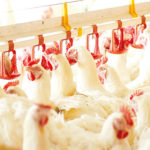Nigeria is leading in the production of Cowpea, popularly called beans and the country also holds the record as the greatest consumer of the crop.
Cowpea is vital for a lot of reasons but in Africa, it is a crop that forms the bulk of food eaten in each household on a daily basis.
With just 1 cup or 171 grams of beans containing 13.22g of protein, it’s a very good source of vegetable protein and can serve as meat to people who cannot afford animal protein.
Dietary fibre, which is known for its ability to maintain bowel health, protect us from colon cancer and reduce blood cholesterol levels by working as a bulk laxative and bringing down reabsorption of cholesterol-binding bile acids in the colon, is found in abundance in cowpea, including the presence of the plant estrogen – Biochanin-A, making it an anti-cancer food.
Other health benefits of cowpea include; Gluten free, and can be enjoyed by people with celiac disease and gluten-allergy. Rich in essential amino acids and B vitamins, with a very high content of the very important folate, making it one of the preferred delicacies for pregnant women as folate may help prevent neural-tube defects in babies.
Cowpea contains several essential minerals like Copper, Iron, Selenium, Calcium, Zinc, Phosphorus, Potassium and more. It contains little fat, making it a go-to food for people on a low-fat diet and with just 1 cup of cowpea containing 35.5g of carbohydrates (198kcals), cowpea can be filling, making it suitable to ward off hunger especially in a weight loss diet.
It also contains vitamin B1, which supports a healthy cardiovascular system, Improves insulin sensitivity due to its magnesium content and sits comfortably as a low GI food option for people with diabetes.
The recent discovery of the use of toxic insecticides to preserve legumes, especially cowpea has left many lovers of this delicious food crop to shiver. While farmers and sellers of cowpea are being blamed for being selfish and insensitive to the dangers that such chemicals can pose to human health, they should also be praised for their genuine motive to make this food available by preventing the activities of the feared Maruca pod borer and other insect attackers.
The solution however is here with us already through the genetically modified cowpea. Our farmers no longer need to spray a lot of toxic chemicals on our beans, yield will increase, and more beans will be available for food.
The genetically improved beans (cowpea) can reposition beans as the ‘food security crop’ in Nigeria. With the insertion of the gene of the biopesticide, Bacillus thuringiensis (Bt.) in the genetically improved beans, conferring it with the characteristic trait of resistance insects and pests attack that will help reduce the need to spray insecticides, and boost yield, farmers can now enjoy great benefits from their efforts, and consumers will have this nutrient dense food crop available always and safe for their consumption.
In terms of safety, generally many studies have revealed that GM crops have been proven to be safe for food and feed and to the environmental.
The reason for this is very simple, some GM crops that have been developed to resist pests and insects attack, which by implication means that the need to spray pesticides and other chemicals to control pests or weeds is drastically minimized.
According the Country Coordinator of Open Forum on Agriculture Biotechnology (OFAB), Dr Rose Gidado, “it was as a result of excessive use of chemical pesticides in Cowpea that prompted the European Union to place ban on Nigerian Cowpea”.
Dr Gidado further said “The farmers will benefit high and strong yields which will make them make profits, the 80 per cent loss that used to be incurred by farmers because of Maruca pest infestation will stop, there will be reduction in insecticide use”.
At a Press conference recently, Cowpea farmers, the National Biotechnology and Biosafety Consortium (NBBC) and some Civil Society Organizations commended the development of the Pod-Borer Resistant beans (PBR-Cowpea).They stated that that it is a confirmation that scientific expertise in Nigeria have reached the stage to provide a home grown solution to pest and diseases problems facing the agricultural of the country.
The Pod Borer insect, scientifically called Maruca Vitrata has the capacity to damage over 80 per cent of Cowpea pods while on farm if enough chemical was not used by the farmer to control.An average of 6-8 time sprays is need to control this insect, else it will damage the entire crop and leave the farmer with nothing.
It is at the backdrop that scientists enmbarked on a search to get the permanent solution to Maruca Vitrata, and the Pod Borer Resistant (PBR) Cowpea was developed to assist farmers in saving money and enjoy good health while engaging in farming.
The PBR Cowpea has the potential to resist this Maruca from destroying the plants. PBR Cowpea makes it possible for farmers to plant and harvest quality yield twice in a year with reduced chemical spraying in the farm which makes it less expensive to plant than the conventional cowpea variety.
According to the Principal Investigator of the PBR Cowpea, Professor Mohammed Ishiyaku, the new Cowpea requires just about 2 to 3 spray of chemicals for a planting season to control the pest.
“Instead of spraying the cowpea up to 8 times, this new material has the potential to do a maximum of 3 sprays, it can do very well compared to the one that can do with 8 sprays of insecticide.
“We are targeting towards reducing insecticide spraying in this new variety when it is released from around 8 to a maximum of 3 sprays, that’s going to be a tremendous reduction in the application of insecticide in the growth of cowpea.
“Cowpea that are not improved requires about 8 sprays of insecticide, hopefully we plan to reduce the amount of insecticide so that farmers can save money from that, not only that, this new variety of cowpea has the potential to produce between 100 to 150 per cent more yield increase at the end if the day.
“For every one hectare a farmer sprays, he needs to spend at least N5400 for buying insecticide along, not to talk of paying those who will spray the farm, water and others, but with this new variety, the farmer can spend about N1000 or N2000 per hectare, the reduction of about N3400 will make huge difference for the production”, Professor Ishiyaku noted.
On the economic benefits of the PBR Cowpea, Professor Ishiyaku said minimum of N16 billion is expected to be saved from adopting this new technology, and Nigeria is expected to get as much as N48 billion if this technology is adopted.
“For this variety, the quick arithmetic we made is we are going to save annually a minimum of N16 billion from the adoption of this new variety if it is released, and in terms of yield increase, Nigeria can get as much as N48 billion as a result of planting this new variety”.
“The figures came from 20 per cent yield increase over the normal cowpea, and by growing 1 million hectares, and a hectare will yield N120,000 per ton, and if calculated, it will get to N48 billion”, he explained.
The President of NBBC, Professor Celestine Aguoru while listing the importance of PBR Cowpea, said it helps in “reduction in the use of dangerous chemicals, protection of Nigeria’s position as the largest producer of beans, reduction in the spending of Nigeria’s foreign exchange in the purchase of over 500,000 tons of beans annually from other countries, farmers can now heave a sigh of relief from chemicals which they have to spray about 10 times for each beans season and that Nigeria is going to save a lot of foreign exchange used in the importation of chemicals”.
He said other benefits include the fact that farmers health, water bodies across the country and the environment will no longer suffer extreme pollution from the chemicals used by farmers to keep Maruca at bay and that the younger generation will now be attracted to farming knowing that a bumper harvest is guaranteed.
“Today, beans from Nigeria is not accepted at the international market due to heavy use of chemical on farms and in storage, this development should worry any right thinking Nigeria but some who have constituted themselves into perpetual critics see nothing bad in that, they want government to ban the GM beans”,
Meanwhile, the Director General of the National Biosafety Management Agency (NBMA), Dr Rufus Ebegba said all measureshave been put in place by the Agency to ensure that the PBR Cowpea does not have any negative effect on both humans and the environment.
Ebegba said the Agency would not just relent after certifying the wholesomeness of the crop, but will continue engaging farmers and the general public to get feedback on the behavior of the new Cowpea variety.
“We do holistic analysis the organism, if it is genetically modified means, we compare it with the one that is not genetically modified, we do the analysis and observe it for some time to see whether the one that is genetically modified the content will change or manifest some strange gene’ if that is not done we confirm them to be safe, and there are safety standard that we adopt, and from time to time, this specimen will be collected, we have a genetically modified organism analysis laboratory, we will be analyzing these products from time to time.
“Apart from scientific analyses of it, we will also be looking at the socioeconomic concern, we will be carrying out a survey where these things are released and, we ask the farmers whether they are benefiting or they are not benefiting or there are manifestations that they consider not good for them, so one that is done, we will know what to do immediately and withdraw those products, and carry out litigation measures.
“Our business is to ensure safety, and we are prepared, we have started the process, let the members of the public know what is coming, what are the measures that are being put in place, the science of the developing it is already being analyzed by the scientist himself, so let those who have the knowledge also get themselves involved.
“As for the Agency, we are well prepared to analyze the product to ensure that it is safe, if it is not safe, we will not approve it, if it is safe, we have no reason not to approve it”, Dr Ebegba said.
Furthermore, the Acting Director General the National Biotechnology Development Agency (NABDA), Professor Alex Akpa said “Cowpea (beans) is a major food crop in this country and it is the protein source of the common man, so it is very useful product, and before this invention, it has been very difficult for farmer to grow beans, but with this new technology, we now have beans that is resistant to Maruca which is a major insect that destroys over 80 per cent of this crop.
“So this will lead to saving of billions of Naira not only for our farmers, but also for our country, and in addition, it is going to lead to the reduction in the use pesticides which does not only destroy the environment, but also harmful to those who apply them. So it is very useful development, that’s what we have been looking for”.
Now, if PBR Cowpea can resist the devastating attack of the insect larva of Maruca Vitrata, this means that the use of pesticides on the farm will be drastically reduced, implying that the environment will be protected from pollution- cost savings for farmers and Cowpea yield increase thereby translating to economic boom and food sufficiency.






